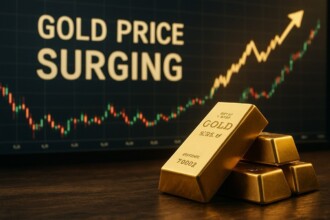In Germany, inflation showed an increase in December which turned out to be higher compared to the initial expectations regarding the intensity of the dynamic of this indicator.

The mentioned figure was fixed at 2.9% last month. The relevant information was published by the German statistics office Destatis in the first reading since the country’s government was dissolved late in December.
Published on Monday, January 6, the preliminary print on the consumer price index in Germany is harmonized across the eurozone for comparability. This is comparable to the forecast of 2.6% of the analysts surveyed by the media.
Destatis data shows that the harmonized index of consumer prices in Germany rose 0.7% month-on-month in December.
It is worth noting that December was the third month in a row when the mentioned country’s economic system demonstrated an inflation rate exceeding the European Central Bank’s target of 2%. In September, the corresponding figure in Germany was recorded at 1.8%. In October, German inflation showed an increase to the 2.4% mark. In November, this indicator remained at the same level.
It is worth noting that the state of affairs in the German economic system is a very important factor impacting the situation in the entire eurozone. This country’s economy is one of the largest in the mentioned region.
The so-called core inflation in Germany showed an increase in December. The corresponding figure was recorded at 3.1%. In November, core inflation in Germany was 3%. It is worth noting separately that this indicator does not take into account food and energy costs.
Data from the statistics office also shows that inflation in the service area increased in Germany in December. The corresponding figure last month was recorded at 4.1%. In November, core inflation in Germany was 4%.
Carsten Brzeski, global head of macro at ING, said the data released on Monday suggested that the summer celebrations over the successful conquering of the inflation monster were premature. According to the expert, less favorable energy-based effects have become the main driving force behind the re-acceleration of inflation in Germany.
Carsten Brzeski expects that in the mentioned country, the stickiness of inflation at slightly too high a level still looks set to continue as favorable energy base effects will continue to peter out while wages are increasing.
It is also worth noting that Germany is currently in the condition of political uncertainty. Such a situation in the country cannot be a factor of positive impact on the economic situation. Also, political uncertainty cannot be a neutral factor. In this context, it is worth clarifying that the mentioned situation is to a certain extent projected onto the condition of all aspects of the country’s existence as a kind of functional space, including in the economic dimension.
Germany will hold federal elections next month. Now, the former ruling coalition broke apart in November when Chancellor Olaf Scholz sacked former Finance Minister Christian Lindner and announced that he would call for early elections.
As we have reported earlier, German Factory Orders Demonstrate Growth.









